Dave Kalmbach Story
The decade of the 1960’s was a particularly rich one in the history of Michigan rock and roll. One of the most important genres during that time period was ‘garage rock’, a name given to the sounds produced by the hundreds of teen bands that emerged all around the state in the wake of the British Invasion. Dave Kalmbach’s Great Lakes Recording Studio played a very important role in the garage rock movement by offering teen bands the chance to record a 45 that could be sold off the bandstand or at local record shops, given to potential employers, and even get airplay on one or more of the many AM rock and roll radio stations that dotted the state.
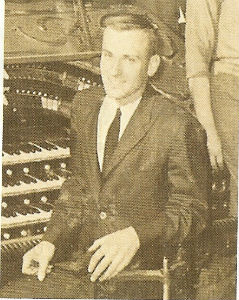
David Kalmbach from the cover of the Dave and the Shadow’s Christmas LP c.1963
Kalmbach was a young musician and electronics buff who was also a recording artist himself, waxing two instrumental singles by Dave and The Shadows, “Blue Dawn” b/w “Here After” and “At the Fair” b/w “Dancing Cheek To Cheek”, at the famed Chess Studio in Chicago and having them issued on the subsidiary Check-Mate label in 1962. It was at the Chess Studio that Kalmbach was introduced to the Leslie organ speaker. It used the Doppler Effect to get the vibrato in the recording, and Kalmbach purchased one after he returned to East Grand Rapids and employed it on future recordings.
Kalmbach’s group used the Leslie on the first single released on his own Fenton label shortly thereafter, the instrumentals “Faith” b/w “Playboy”. Kalmbach had opened his recording studio at the Our Theatre in Grand Rapids, Michigan, but by 1964 he would move his operation to another movie theatre in nearby Sparta, Michigan.
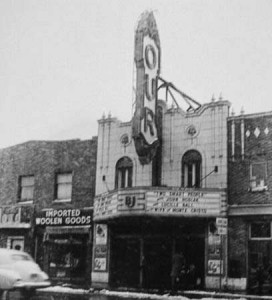
Our Theater on Leonard St. Next to the Silver Cloud (now Kuzzins bar)
Frank Uhle explained how Kalmbach’s business worked in The Fenton Sound. “The Fenton business model was pay-as-you-go, with the company providing recording and mastering services for a fee. The records were manufactured out of state at first and then at the American Record Pressing plant in Owosso, Michigan”. A.R.P. had pressed Berry Gordy’s first 45’s on his Tamla label in 1959, and by the middle of the 60’s the plant was pressing records for all of his Motown labels.
Uhle also wrote; “Over the span of a half-dozen years, the Fenton operation would issue as many as one hundred 45s and a handful of albums. In addition to bands from the Grand Rapids metro area, and small nearby towns like Cedar Springs and Sparta itself, artists recorded by Kalmbach came from throughout Western Michigan, the Lansing metropolitan area in the center of the state; Traverse City to the north; and the Flint/Bay City area on its east side”.

Dave Kalmbach is pictured on the left. This photo comes from back side of the cover of the 1968 LP entitled Bobby Charles Live at Wells Fargo Lounge. Kalmbach traveled to Moline, Illinois to record this LP
“The majority of records released on Fenton and sister label Great Lakes (as well as affiliated custom imprints such as Sound of the Sceen, Dubonay, Vark, Swade etc.) were by teenage garage bands, but the studio also recorded folk singers, country bands, a poet, and lounge acts. These latter acts accounted for three of the label’s four known LPs, one of which featured young guitarist Danny Gatton”.
Uhle went on to explain; “Within the garage rock genre Fenton produced a surprisingly large number of memorable recordings, including several that were huge hits on local radio. In contrast with more urban regional scenes like Chicago or Detroit, few of the bands appear to have been heavily influenced by blues or soul music, with their sound generally bearing witness to the members’ relatively uncomplicated suburban or small-town backgrounds. Musical inspiration typically came from the melodic, dynamic styles of groups like The Beatles, Byrds, Beach Boys, and Paul Revere and the Raiders, which, when combined with teenage exuberance and a dose of hormonally-induced male aggression, resulted in the classic Fenton sound”.
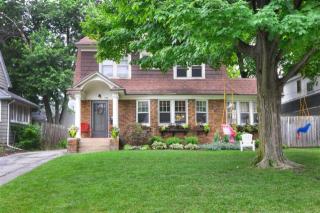
Former Kalmbach family home in East Grand Rapids, Michigan. Dave had a pipe organ and recording studio in the basement of this home.
Dave Kalmbach was born and raised in the affluent suburb of East Grand Rapids. His father was a partner in Wheeler-Van Label, a Grand Rapids company that did printing for big clients like Wrigley’s chewing gum out of Chicago. The Kalmbach family lived in a comfortable home on Maxwell Street and had enough money to easily support Dave’s early interest in both music and electronics.
Dave Kalmbach’s first brush with fame came at the age of 14 as a result of a news article in the Grand Rapids Press about the electric-powered wooden car he built with a friend and drove to East Grand Rapids High School. He also developed his own pirate radio station while still in high school. It was very popular among teens in East Grand Rapids during the late 50’s until the FCC stepped in and shut Kalmbach down.
Kalmbach had taken music lessons from an early age and was an accomplished keyboard player. He formed his first band, Dave and the Shadows while still in high school. Mel Plumley, Jim Wilson, Rick Sutherland, Larry Cook, and Tom Marvin were members of the Shadows, which was strictly an instrumental combo at this point in time. Jerry Lewis and Pat Quillan also played in the band at one time or another. According to both Tom Marvin and Dave’s longtime friend Mick Noonan, Kalmbach set up and maintained a small studio in his parent’s basement before he began recording at the Our Theatre, located on Leonard Street in Grand Rapids.
Tom Marvin remembers that there weren’t that many bands around at that time, but the competition was fierce. “There was no love lost among the groups – everyone thought they were better than everyone else – including the Kingtones”. Dave and the Shadows first Fenton single made use of the Paige pipe organ, and “Playboy” got airplay on WGRD (Kalmbach was the head engineer at the station) leading to bookings at numerous DJ dances.
Kalmbach first became fascinated with the Paige pipe organ while doing upkeep on the instrument while working as the manager of the Our Theatre. He also started the first version of the Great Lakes Recording Studio there. The Our Theatre had a basement where Dave set up his recording gear. Kalmbach didn’t build any of his equipment, but he did put everything together. His family helped him purchase the best electronic apparatus on the market at that time, an Ampex 351 tape recorder and Altec condenser microphones.
The pipe organ was the band’s gimmick on its recordings, but Kalmbach used his Leslie organ at the live gigs. Tom Marvin says that Dave and the Shadows had the only fully integrated sound system of any band in the Grand Rapids area; everyone else had their own individual amps. This put the band in a class by themselves, and as a result, they were invited to open for Bobby Vinton at his appearance at the Stardust Drive-In in Grand Rapids in the early 60’s. They also played at the Club Ponytail in Petoskey. It was an old nightclub that was used as a speakeasy and gambling joint during Prohibition, but by the 1960’s it was turned into one of the most popular teen clubs in northern Michigan, booking both young Michigan bands as well as nationally known acts like The Beach Boys, Del Shannon, and The Four Tops.
Besides recording material with Dave and the Shadows, Kalmbach recorded commercials for a number of businesses in and around Grand Rapids at the Our Theatre. Sue Greiner, a singer with The Eschelons, was often brought in to do vocals on the commercials; and when Kalmbach came up with the idea to do a Christmas album with Dave and the Shadows, Greiner was recruited to do some singing. According to Tom Marvin, the “Two Sides Of Christmas” LP was recorded in the early 1960’s, and that Harry Lucas shared some of the vocals with Sue Greiner.
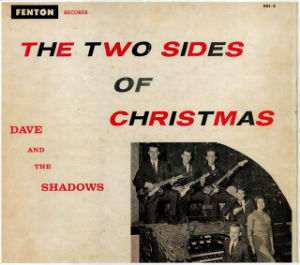
Scan of the cover of the Dave and the Shadows Christmas LP, courtesy of Sue Greiner
It was unusual for a local band to record an album at this time. One side was made up of traditional Christmas songs while the other side had commercial tunes including their cover of “Jingle Bell Rock” and original compositions such as “Theme To The Our”, a tribute to the theatre where the album was recorded. Tom Marvin left Dave and the Shadows shortly before the album was completed, thereby incurring the wrath of Kalmbach’s mother, who was in charge of the band’s finances. Jack Hazewinkel of The Eschelons was brought in to play bass on the remaining tracks, and, in a fit of pique, Mrs. Kalmbach made sure that Marvin’s name was removed from the album credits.
It’s not certain why Kalmbach moved his operation out of the Our Theatre, and there is some disagreement about what happened next with the theatre’s pipe organ. Fitz Green claims that Kalmbach purchased the Paige pipe organ when he left, and installed it in the basement of his parent’s home in East Grand Rapids; and that he operated his Great Lakes Recording Studio in the basement until he moved his business to Sparta in 1964.
According to Green, the pipe organ was everywhere in the basement. The volume of the massive instrument actually caused cracks in the walls. Kalmbach also had a Hammond B-3 and his Leslie organ down there. In a little room or booth, he had a mastering machine, and a two-track recording device. The recording space was very small, but Kalmbach also employed several reel-to-reel tape recorders to produce echo effects.
Green had been the Kalmbach’s paper boy back in 1959 and 1960, and was a 15-year-old guitarist in 1963 when he and his band, The Renegades IV, recorded their first single in the basement studio. The instrumental pairing of “Greensleeves” b/w “Autumn Night” would be just the fourth single released on the Fenton label (the others being Dave and the Shadows, J.D. and the Dynamics (featuring Kalmbach on organ), and the Rhythm Rockers).
Jack Hazewinkel, on the other hand, claims that he helped Kalmbach move the pipe organ directly to Sparta from the Our Theatre. Mick Noonan also supports this scenario. If that is the case, the pipe organ in the basement was a different instrument. Green, Noonan, and Hazewinkel are all in agreement, however, that Kalmbach installed the Paige pipe organ in the Sparta Theatre in 1964.
That year, Kalmbach and his significant other, Bruce Smith, had formed a business partnership and purchased the Sparta Theatre. They set up the Great Lakes Recording Studio inside the building and used it as a recording facility when films were not being shown.
Fitz Green and his band, now renamed The Renegades V, recorded their second single in Sparta in 1964. “Wine, Wine, Wine” b/w “Love And Fury” was released on the Duboney label, the first of Kalmbach’s productions not to be issued on Fenton. Green remembers that they recorded in a lower area on the floor between the theatre’s seats and the theatre stage with the singer off to the side. Kalmbach installed his recording equipment in the theatre’s projection booth.
Green also revealed that Kalmbach would often ask the drummer for his leather wallet and then place it on the snare drum to cut down on the rattling sound. He also didn’t like bass drums, and they were often mixed down in his recordings.
The Renegades V’s “Wine, Wine, Wine” got local airplay as did all of Kalmbach’s recordings. His Fenton operation was one of only a small number of studios in town, and he was very well-connected with radio stations because of his recordings and performances with Dave and the Shadows and also because of his job at WGRD.
Kalmbach started double tracking vocals at Sparta. The first record to use this approach was “Nothing I Can Do”, the first single by The Sheffields, a band from Holland, Michigan, with a sound similar to The Searchers. The technique was also used on “You Treat Me Bad” by The JuJus, a Grand Rapids band who recorded with Kalmbach in 1965. The song would become Fenton’s first big local hit, reaching # 2 on station WLAV and leading to an appearance by the band on the TV dance show McKay’s Place, as well as gigs before screaming female fans tearing at their uniforms and hair in a display that could only be described as “JuJu-mania”.
Using two AMPEX 602 stereo recorders and a steel plate EMT reverb system, Kalmbach recorded a great number of teen garage band singles at the Great Lakes Studio in Sparta from 1964 to the end of the decade. According to Frank Uhle, Kalmbach “ran a very laid-back operation that respected the needs of his young musicians”. Kim Weighous of Grand Rapids’ Pedestrians, remembered that Kalmbach sat through nearly 50 takes of “Think Twice” before getting one they were all satisfied with. The record went on to become the # 1 song of 1966 in Grand Rapids.
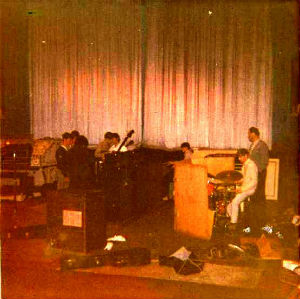
Tonto & The Renegades at the Sparta studio. This is the only photo of the inside of the Sparta studio that has surfaced so far.
The list of Michigan garage bands that benefitted from Kalmbach’s guiding hand is long and included teens from around the state. The Beaux Jens and Tonto & The Renegades both hailed from Grand Ledge, located near Lansing. Both groups released singles on the Sound Of The Sceen vanity label, because both bands played regularly at the Sceen teen club located west of their hometown.
Tonto & The Renegades first single, “Little Boy Blue” was voted a Legendary Michigan Song in 2008, the first of Kalmbach’s recordings to be so honored. Both sides of the group’s second single, “The Easy Way Out” b/w “Anytime You Want Some Lovin’” were written and produced by Dick Wagner in the Sparta studio with Kalmbach doing the engineering.
Grand Rapids provided Kalmbach with The Barons, The Fugitives, Lyn & the Invaders, Peter & the Prophets, along with the highly successful Soulbenders whose cover of “Seven and Seven Is” was picked up for national distribution by Mala Records in early 1968. In addition, Kalmbach’s hometown of East Grand Rapids produced the Quests who recorded one of Fenton’s greatest two-sided 45s, “Shadows in the Night” b/w “Tempted”.
Muskegon bands that recorded in Sparta included The Aarvarks, The Blokes, 9th Street Market, and The Pentagons. The Lansing bands who worked with Kalmbach were The Chancellors, The Saharas, and The Plagues, whose lead singer was future Hollywood film director William Malone.
Tiny cities like Fennville produced The Chentelles, Lowell – The Headhunters, Cedar Springs – The Black Watch, and Sparta -The Jades. The Mussies came from South Haven, The Legends from Holland, Poor Boy’s Pride from Grand Haven, The Penetraters from Traverse City, and Bed Of Roses and The Blues Company from Bay City.
All of these bands recorded memorable singles with Dave Kalmbach, but as the teen band scene faded away in the late 1960’s, so did the Great Lakes Recording Studio, which closed its doors by the end of the decade. Unfortunately, Kalmbach lost control of the master recordings at some point. Besides the singles that were released, there are reportedly unreleased demos and outtakes on the tapes that have yet to see the light of day.
Not a great deal is known of Kalmbach’s post-Sparta career. After he closed down his studio, Kalmbach moved along with his pipe organ to Detroit to work in the Artie Fields Studio. He and the organ later moved to Toronto, before purchasing a movie theatre in Marietta, Pennsylvania. He installed the pipe organ there and established a new recording business in the facility.
In later years, Kalmbach was stricken with multiple sclerosis, a serious progressive disease of the central nervous system. Sadly, he is currently in the final stages of the disease and is under 24-hour care in Pennsylvania.
Because of his many contributions to the state’s musical legacy, Dave Kalmbach was selected as an Honorary Inductee to the Michigan Rock and Roll Legends online hall of fame in 2011.
This article was written by Gary Johnson aka Dr. J., who owns and operates the Michigan Rock and Roll Legends website at http://www.michiganrockandrolllegends.com/
Gary is a good friend of the West Michigan Music Hysterical Society and has helped us a great deal. We want to thank him for generously allowing us to post this, as well as other articles which he has written.
4/25

2 Responses to Dave Kalmbach Story